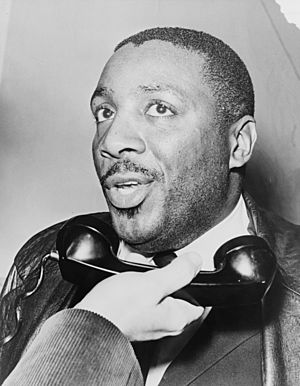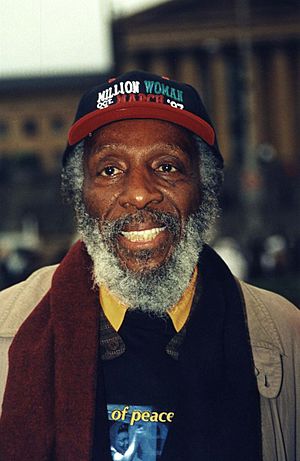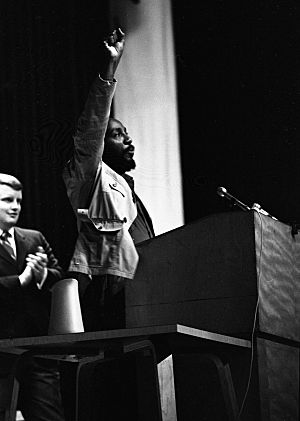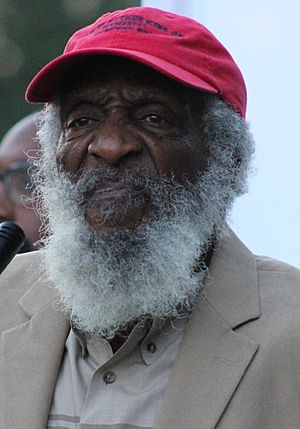Dick Gregory facts for kids
Quick facts for kids
Dick Gregory
|
|
|---|---|

Gregory in 1964
|
|
| Born |
Richard Claxton Gregory
October 12, 1932 St. Louis, Missouri, U.S.
|
| Died | August 19, 2017 (aged 84) Washington, D.C., U.S.
|
| Occupation |
|
| Years active | 1954–2017 |
| Spouse(s) |
Lillian Smith
(m. 1959) |
| Children | 11 |
| Comedy career | |
| Medium |
|
| Subject(s) |
|
| Notable works and roles | In Living Black and White (1961) Write Me In! (1968) |
Richard Claxton Gregory (October 12, 1932 – August 19, 2017) was an American comedian and a strong leader in the Civil Rights Movement. He was also a business owner and a vegetarian activist. His books were very popular.
Gregory became well-known, especially in African-American communities in the southern United States. By 1961, he was a regular in comedy clubs, appeared on TV, and released comedy albums. He was a key figure in political activism during the 1960s. He spoke out against the Vietnam War and unfair treatment based on race. He was arrested many times and went on several hunger strikes to protest. Later in life, he became a speaker and author, often talking about spirituality. Gregory passed away from heart failure in August 2017 at the age of 84.
Contents
Growing Up
Gregory was born in St. Louis, Missouri. His mother, Lucille, worked as a housemaid. At Sumner High School, his teachers helped him a lot. He was also a great runner, winning the state cross country championship in 1950.
Gregory earned a scholarship for track to Southern Illinois University (SIU). There, he set school records in running. In 1954, he joined the United States Army for two years. His commanding officer noticed how funny he was. This led Gregory to start doing comedy in the Army, where he won several talent shows. After the Army, he briefly returned to SIU in 1956. However, he left because he felt the university only wanted him to run, not to study.
Hoping to become a professional comedian, Gregory moved to Chicago, Illinois. He joined a new group of black comedians like Nipsey Russell and Bill Cosby. These comedians moved away from old, unfair ways of showing black characters. Gregory used current events and racial issues in his comedy. For example, he once joked, "Segregation is not all bad. Have you ever heard of a collision where the people in the back of the bus got hurt?"
Comedy Journey
Gregory began his comedy career while in the military in the mid-1950s. After leaving the Army in 1956, he moved to Chicago to become a professional comedian.
In 1958, Gregory opened his own nightclub, the Apex Club, in Illinois. The club didn't do well, causing him financial problems. In 1959, he got a job as the master of ceremonies at the Roberts Show Club.
While working for the United States Postal Service during the day, Gregory performed comedy at small nightclubs. These clubs were mostly for black customers. He explained that black performers could sing and dance in white clubs, but they weren't allowed to stand and talk to white audiences like comedians do.
In 1961, Hugh Hefner saw Gregory perform at the Roberts Show Bar in Chicago. Gregory said Hefner helped launch his career. Hefner hired Gregory to perform at his Chicago club.
In 1964, Gregory's autobiography was published. This book has been in print ever since.
Activism and Public Life
Dick Gregory was listed as number 82 on Comedy Central's list of the 100 Greatest Stand-ups of all time. He also has his own star on the St. Louis Walk of Fame.
He was a co-host on radio shows and often appeared as a guest. He also appeared on TV shows like Wonder Showzen. Gregory spoke at the funeral of James Brown in 2006.
In 2013, Gregory gave a speech at Bryn Mawr College for Black History Month. His main message to the students was to never accept injustice.
Towards the end of his life, he was featured in a book called Listen, Whitey: The Sights and Sounds of Black Power 1965–1975. This book highlighted how entertainment during the Civil Rights era often had political messages. Gregory was known for comedy that made people laugh but also questioned powerful systems.
Political Efforts
Gregory started his political journey by running for Mayor of Chicago in 1967. Even though he didn't win, he continued to be involved in politics.
He ran for president in the 1968 United States presidential election. He ran as a write-in candidate for the Freedom and Peace Party. He received over 47,000 votes. After his campaign, Gregory wrote a book about it called Write Me In.
Standing Up for Rights
Fighting Apartheid
In 1979, Gregory spoke at the Amandla Festival. He criticized President Jimmy Carter and showed his support for the international Anti-Apartheid Movement. This movement worked to end the unfair system of racial separation in South Africa.
Civil Rights Work
Gregory was very active in the Civil Rights Movement. In 1963, he spoke in Selma, Alabama, to support a voter registration drive called "Freedom Day."
In 1964, Gregory became even more involved in civil rights and protests against the Vietnam War. He went on several hunger strikes and campaigns in America and other countries.
In 1964, Gregory helped search for three missing civil rights workers in Philadelphia, Mississippi. He offered a $25,000 reward for information, which helped the FBI find the men who had been killed.
Supporting Women's Rights
Gregory was a strong supporter of women's rights. In 1978, he joined other leaders like Gloria Steinem and Betty Friedan to lead a large march in Washington, D.C. This march was to support the Equal Rights Amendment (ERA), which aimed to guarantee equal legal rights for all American citizens regardless of sex. The march helped extend the deadline for the ERA, though it was not ultimately ratified.

Seeking Truth About JFK Assassination
Gregory questioned the official findings of the Warren Commission about the assassination of John F. Kennedy. He helped bring attention to evidence and pushed for more investigation into the event. In 1975, the famous Zapruder film of JFK's assassination was shown to the public on TV for the first time because of efforts by Gregory and others. This led to further government investigations.
Honoring Martin Luther King Jr.
Gregory and researcher Mark Lane did important work looking into the assassination of Dr. Martin Luther King Jr.. Their research helped the U.S. House Select Assassinations Committee investigate the murder. Gregory also spoke at Dr. Martin Luther King Jr.'s birthday celebration in 1998, with President Bill Clinton present.
Native American Rights
In 1966, Gregory and his wife were arrested while protesting with the Nisqually people in Washington state. They were protesting state laws that limited the tribe's traditional fishing rights, which were guaranteed by a federal treaty. Gregory was later released from jail after six weeks of fasting. He did this to draw attention to the government's violation of Native American treaties.
Iran Hostage Crisis
Gregory was also active during the Iran hostage crisis in 1980. He traveled to Tehran to try and help free the American hostages. He even went on a public hunger strike there.
Promoting Health and Animal Rights
Gregory became a vegetarian and a fasting activist in 1965. He based this on the idea of nonviolence from the Civil Rights Movement. His 1973 book, Dick Gregory's Natural Diet For Folks Who Eat, talked about how fasting and a vegetarian diet helped with weight loss. He also created a diet drink called Bahamian Diet Nutritional Drink.
In 1984, he started Health Enterprises, Inc., a company that sold weight-loss products. He wanted to help improve the health of African Americans. In 1985, he introduced the Slim-Safe Bahamian Diet, a powdered mix. The Ethiopian government even used Gregory's formula to help fight malnutrition during a famine.
In 2003, Gregory wrote letters with Cornel West to the CEO of KFC on behalf of People for the Ethical Treatment of Animals (PETA). They asked the company to treat animals better.
Gregory believed that civil rights and animal rights were connected. He once said, "Because I'm a civil rights activist, I am also an animal rights activist. Animals and humans suffer and die alike."
Personal Life
Gregory met his wife, Lillian Gregory, at an African-American club. They married in 1959 and had 11 children.
Health and Passing
Gregory was diagnosed with lymphoma in 1999. He said he treated the cancer with herbs, vitamins, and exercise.
He passed away from heart failure in a hospital in Washington, D.C., on August 19, 2017, at 84 years old. He had been in the hospital for a bacterial infection a week before his death.
Discography
- In Living Black and White (1961)
- East & West (1961)
- Dick Gregory Talks Turkey (1962)
- The Two Sides of Dick Gregory (1963)
- My Brother's Keeper (1963)
- Dick Gregory Running for President (1964)
- So You See... We All Have Problems (1964)
- Dick Gregory On: (1969)
- The Light Side: The Dark Side (1969)
- Dick Gregory's Frankenstein (1970)
- Live at the Village Gate (1970)
- At Kent State (1971)
- Caught in the Act (1974)
- The Best of Dick Gregory (1997)
- 21st Century "State of the Union" (2001)
- You Don't Know Dick (2016)
Filmography
- The One and Only Dick Gregory (2021)
- The Leisure Seeker (2017)
- The History of Comedy (2017)
- Ir/Reconcilable (2014)
- Steppin: The Movie (2009)
- One Bright Shining Moment (2006)
- Wonder Showzen (2005)
- Reno 911! (2004)
- Children of the Struggle (1999), as Vernon Lee
- Panther (1995), as Rev. Slocum
- The Glass Shield (1994)
- ABC Stage 67 (TV Series) (1967), as Civil Rights Marcher
- Sweet Love, Bitter (1967), as Richie 'Eagle' Stokes
See also
- Timeline of the civil rights movement
- Gregory v. City of Chicago
- List of peace activists
- List of civil rights leaders



